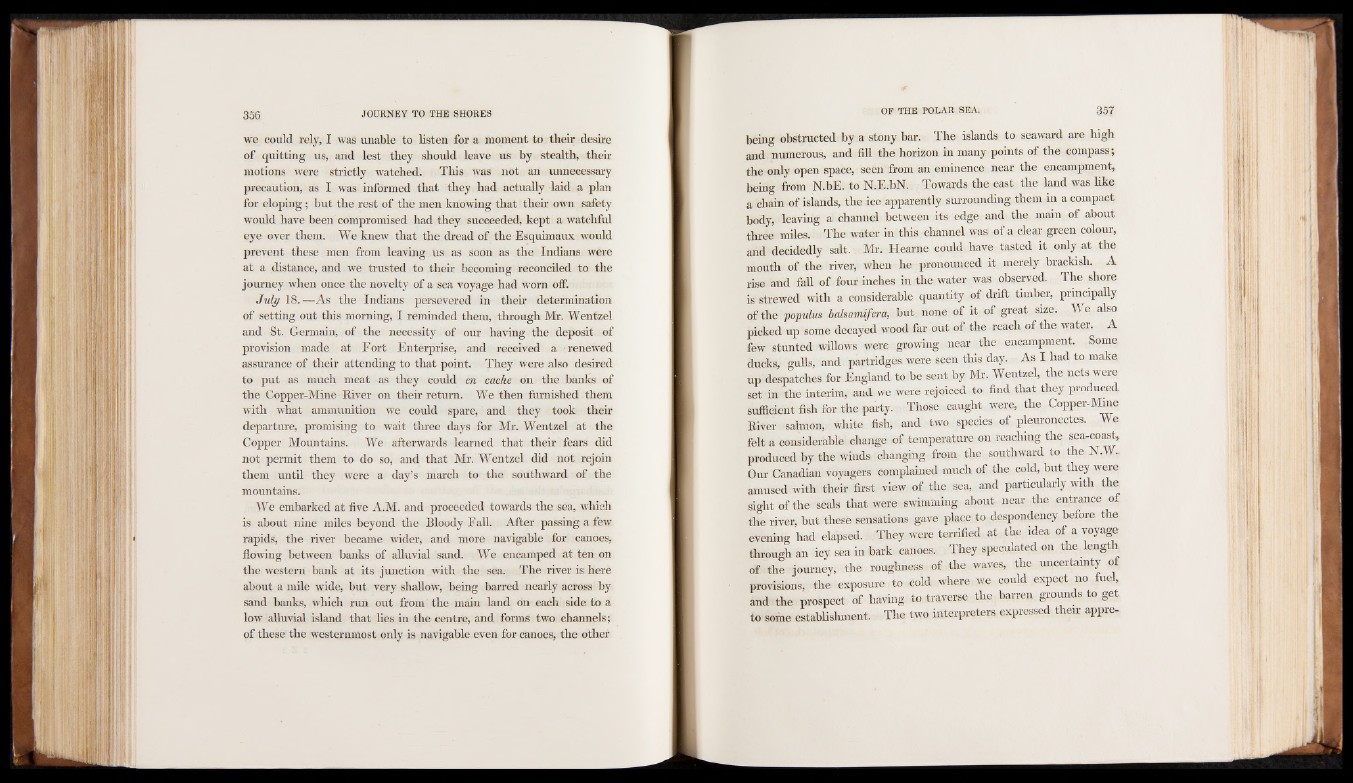
we could rely, I was unable to listen for a moment to their desire
of quitting us, and lest they should leave us by stealth, their
motions were strictly watched. This was not an unnecessary
precaution, as I was informed that they had actually laid a plan
for eloping ; but the rest of the men knowing that their own safety
would have been compromised had they succeeded, kept a watchful
eye over them. We knew that the dread of the Esquimaux would
prevent these men from leaving us as soon as the Indians were
at a distance, and we trusted to their becoming reconciled to the
journey when once the novelty of a sea voyage had worn off.
July 18. — As the Indians persevered in their determination
of setting out this morning, I reminded them, through Mr. Wentzel
and St. Germain, of the necessity of our having the deposit of
provision made at Fort Enterprise, and received a renewed
assurance of their attending to that point. They were also desired
to put as much meat as they could en cache on the banks of
the Copper-Mine River on their return. We then furnished them
with what ammunition we could spare, and they took their
departure, promising to wait three days for Mr. Wentzel at the
Copper Mountains. We afterwards learned that their fears did
not permit them to do so, and that Mr. Wentzel did not rejoin
them until they were a day’s march to the southward of the
mountains.
We embarked at five A.M. and proceeded towards the sea, which
is about nine miles beyond the Bloody Fall. After passing a few
rapids, the river became wider, and more navigable for canoes,
flowing between banks of alluvial sand. We encamped at ten on
the western bank at its junction with the sea. The river is here
about a mile wide, but very shallow, being barred nearly across by
sand banks, which run out from the main land on each side to a
low alluvial island that lies in the centre, and forms two channels;
of these the westernmost only is navigable even for canoes, the other
being obstructed by a stony bar. The islands to seaward are high
and numerous, and fill the horizon in many points of the compass;
the only open space, seen from an eminence near the encampment,
being from N.bE. to N.E.bN. Towards the east the land was like
a chain of islands, the ice apparently surrounding them in a compact
body, leaving a channel between its edge and the main of about
three miles. The water in this channel was of a clear green colour,
and decidedly salt. Mr. Hearne could have tasted it only at the
mouth of the river, when he pronounced it merely brackish. A
rise and fall of four inches in the water was observed. The shore
is strewed with a considerable quantity of drift timber, principally
of the populus balsamifera, but none of it of great size. We also
picked up some decayed wood far out of the reach of the water. A
few stunted willows were growing near the encampment. Some
ducks, gulls, and partridges were seen this day. As I had to make
up despatches for England to be sent by Mr. Wentzel, the nets were
set in the interim, and we were rejoiced to find that they produced
sufficient fish for the party. Those caught were, the Copper-Mine
River salmon, white fish, and two species of pleuronectes. We
felt a considerable change of temperature on reaching the sea-coast,
produced by the winds changing from the southward to the N.W.
Our Canadian voyagers complained much of the cold, but they were
amused with their first view of the sea, and particularly with the
sight of the seals that were swimming about near the entrance of
the river, but these sensations gave place to despondency before the
evening had elapsed. They were terrified at the idea of a voyage
through an icy sea in bark canoes. They speculated on the length
of the journey, the roughness of the waves, the uncertainty o
provisions, the exposure to cold where we could expect no fuel,
and the prospect of having to traverse the barren grounds to get
to some establishment. The two interpreters expressed then- appre.